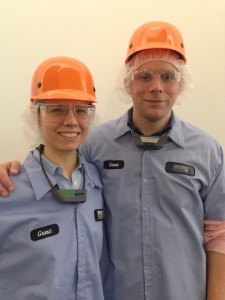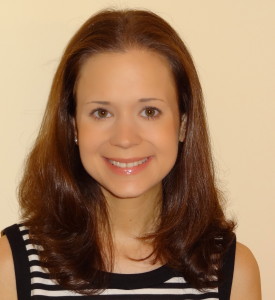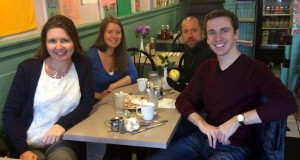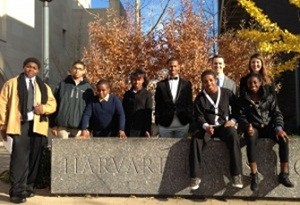[Posted on April 9th, 2015, on the Office of Clinical and Pro Bono Programs Blog]
Anthony was nervous. Sitting across from him was the North Korean Minister of Health. Armed guards stood nearby, ready and waiting. Did a drop of sweat slip off of Anthony’s brow? Perhaps caused by the steamy Pyongyang summer? Or perhaps it fell because Anthony knew that lives depended on this conversation. He opened his mouth to explain.
How did he get here? It was the refugees; they led him here: the North Korean refugees fleeing into China. Anthony, an expert in public health who was then pursuing his graduate studies at the Harvard School of Public Health, had been moved by their stories and had devoted himself to searching for solutions to their plight. In the end, the search led him here, into the Democratic People’s Republic of Korea (DPRK, or North Korea) itself. He knew the only way to truly help the refugees was to tackle the problems that had forced them to leave in the first place: lack of food and basic healthcare.
DPRK was, and is still, suffering from a catastrophic tuberculosis epidemic. People are dying from a curable disease. So many people are infected that there are not resources to treat everyone. In an effort to insure equal access to healthcare, the government requires hospitals admit everyone who needs treatment. However, a patient needs to take medicine continuously over at least six-months in order to cure the infection. Because hospitals are overridden with patients, they are forced to discharge patients after only two months of treatment. This not only leaves them uncured, it also contributes to the rise of drug-resistant strains of the bacteria. These super bug strains (known as multi-drug resistant TB, or MDRTB) are much more costly to treat. If they spread, they pose a formidable threat to global public health.
 Anthony explained to the DPRK Minister of Health his plan: to open companion clinics to house TB patients discharged from current hospitals. There, North Korean medical personnel could continue to administer their drugs up to completion. Anthony would also raise money to buy food for the hospitals, for both the patients and the staff. How could Anthony make all of this happen? He would form a nonprofit organization in the U.S. and conduct fundraising there. Anthony watched the Minister… how would he respond?
Anthony explained to the DPRK Minister of Health his plan: to open companion clinics to house TB patients discharged from current hospitals. There, North Korean medical personnel could continue to administer their drugs up to completion. Anthony would also raise money to buy food for the hospitals, for both the patients and the staff. How could Anthony make all of this happen? He would form a nonprofit organization in the U.S. and conduct fundraising there. Anthony watched the Minister… how would he respond?
Suspicious at first, the Minister soon saw that Anthony sincerely wanted to help. The Minister was a man devoted to improving the lot of his people, and was overjoyed to meet someone with Anthony’s energy and creative ideas. Not only did the Minister agree to support Anthony’s plans, he also instructed his men to escort Anthony wherever he wanted to go, even to regions where foreigners were usually prohibited. Anthony visited clinics around the country, and when he returned to the U.S. he threw himself into building his team and laying the groundwork for what he hopes to be his life’s work: the non-profit organization Justice And Health.
So where do I come in? I was Justice And Health’s student attorney. As a 2L in my third semester of law school. Unbelievable, right?
While Justice And Health was planning how to prevent a major global health catastrophe, its members had not exactly prioritized the legal details of forming a nonprofit. Anthony came into the Transactional Law Clinics for our first meeting, along with Terrence Park, the organization’s administrative mastermind, looking for help with securing federal tax-exempt status. This status is crucial to their mission—without the status they cannot get donations; without donations they cannot build clinics; they cannot feed starving people.
We agreed to take them on as clients, and immediately realized that their incorporation documents were incomplete. I drafted amended articles of organization for them as well as organization by-laws. Then I assembled a massive amount of information for their tax-exempt status application. During my conversations with Anthony and Terrence, I learned what it’s like to try to save the world. And my questions about technicalities actually flagged some important issues that were hard to see from their big-picture vantage point. For example, no one knew who would own the clinical property: Justice And Health or the DPRK government.
After a great amount of legal research, several meetings, and many cups of coffee, I had everything ready to go. I was one email away from filing their application. Then something unexpected happened.
“I had a meeting with folks on the ground and have some updates. When can we speak on the phone?” After spending time reflecting on the details of their clinical construction plan, Justice And Health had changed their strategy. Better to start small and grow from there—instead of an independent clinical unit, they would build a soymilk factory and bakery within the clinical compound. They would supply the ingredients for both. This project would take much less capital to get started and could be up and running much faster than a full clinic.
So my application was out the window. Time to begin on another version.
Even acknowledging the hiccups along the way, words cannot express how much working with Justice And Health helped me grow as both a person and as an attorney. Transactional law probably does not seem like the place to promote a better world. But, after just a few weeks in the Transactional Law Clinics, I was helping do just that.
“Justice And Health has been so fortunate to have access to a resource like the Harvard Transactional Law Clinics,” Anthony Lee said. “Nonprofits like ours that are just getting started face all sorts of legal hurdles. Our TLC student advocate both helped us identify what we needed to do and how. Because she was still learning about this area of law, she brought a level of enthusiasm and curiosity that we couldn’t have expected elsewhere. Not to mention that the price was reasonable enough that our nascent organization could take care of the legal stuff without sacrificing progress on our broader goals.”





